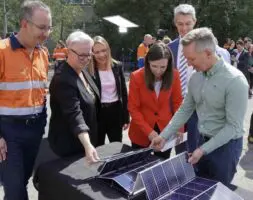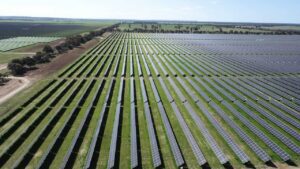Energy efficiency – the money saving and emissions slashing no-brainer that is referred to by the International Energy Agency as “the first fuel” in climate action – has finally got a foothold in Australia’s policy agenda, although only just.
The Albanese government has flagged the launch of consultations on the development of a Commonwealth-led National Energy Performance Strategy, starting with a soon-to-be published discussion paper on how to deliver energy efficiency improvements across the economy.
The first steps to the national strategy were announced on Thursday at the 2022 Energy Efficiency Summit in Sydney, where the federal assistant minister for energy Jenny McAllister conceded Australia lags well behind its international peers on efficiency.
Australia lags shamefully behind
According to the latest Climate Change Performance Index, an independent monitoring tool presented at the annual UN Climate Change Conference, Australia ranks a lowly 54 out of 64 countries for energy performance per capita.
Australia’s energy inefficient homes, in particular, have earned the nation’s existing housing stock a reputation as “glorified tents,” that their cost their inhabitants dearly on thermal comfort and at bill time.
See: Is Australia’s “clean energy” focus adding to its climate and economic problems?
Speaking at the Energy Efficiency Summit on Thursday, McAllister said that while Bowen was steering Australia’s emissions reduction and renewable energy efforts, he had asked his deputy to take up the challenge of the demand side of the energy market.
“Federal leadership on managing energy demand has been missing,” McAllister told the Energy Efficiency Summit on Thursday.
“We have languished for a decade as the international community has left us in the dust. And Australians are paying more for their electricity than they had to.
“Through no fault of their own, Australian homes and businesses are wasting too much energy.
“Preventing this waste is a double win on energy prices. For the consumer, who pays less directly. The reduction in demand lowers costs across the system.
“And energy efficient homes aren’t just cheaper – they are more comfortable and healthier.”
To this last point, McAllister cites a Victorian study that found a relatively minor home energy efficiency upgrade could save $887 per person in the healthcare system over the winter period.
Energy crisis brings efficiency into focus
The huge value of energy efficiency has come into stark relief as a result of the global energy crisis, with many governments around Europe ordering businesses and households to make sometimes significant changes to the way they use power to reduce both overall demand and exposure to high prices.
Federal energy minister Chris Bowen says setting federal energy efficiency policies promises cut energy costs for households and businesses – some have suggested by up to $600 a year – reduce pressure on the grid and help Australia meet its newly boosted emissions target.
“We’re acting to put in place a strategy that will help us create a high energy performance economy, meet our emissions reduction targets, and enable us to put downward pressure on energy prices,” McAllister said.
“And we’re doing this important work in consultation with state and territory governments, businesses, households and community groups across the nation.”
A discussion paper on how to deliver energy efficiency improvements across the economy and help Australia meet its emissions reduction targets, will be released in coming weeks.










